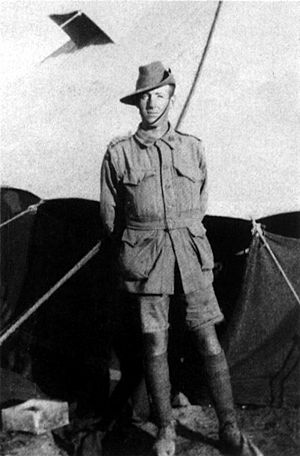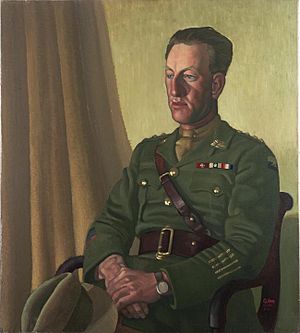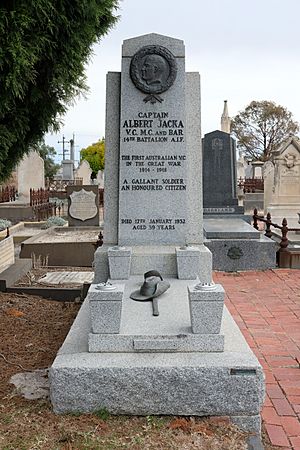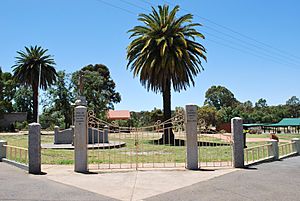Albert Jacka facts for kids
Quick facts for kids
Albert Jacka
|
|
|---|---|
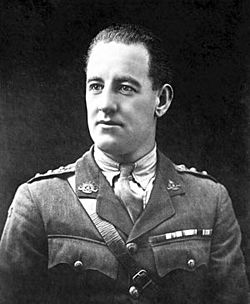
Captain Albert Jacka c. 1920
|
|
| Nickname(s) | Bert |
| Born | 10 January 1893 Winchelsea, Victoria |
| Died | 17 January 1932 (aged 39) St. Kilda, Victoria |
| Allegiance | Australia |
| Service/ |
Australian Imperial Force |
| Years of service | 1914–1920 |
| Rank | Captain |
| Unit | 14th Battalion |
| Battles/wars | First World War |
| Awards | Victoria Cross Military Cross & Bar |
| Other work | Mayor of the City of St Kilda (1930–1931) |
Albert Jacka, VC, MC & Bar (10 January 1893 – 17 January 1932) was an Australian soldier. He received the Victoria Cross (VC), which is the highest award for bravery in the face of the enemy. It can be given to members of the British and Commonwealth armed forces.
Jacka was the first Australian to get the VC during the First World War. He earned it for his brave actions during the Gallipoli Campaign. Later, he fought on the Western Front and was honored two more times for his courage.
After the war, Jacka went back to Australia. He started a business that imported and exported electrical goods. He was also elected to the local council and became the mayor of the City of St Kilda. Jacka never fully recovered from his war injuries and died when he was 39 years old.
Contents
Early Life
Albert Jacka was born on a dairy farm near Winchelsea, Victoria, on 10 January 1893. He was the fourth of seven children. His parents were Nathaniel and Elizabeth Jacka.
When he was five, his family moved to Wedderburn, Victoria. He went to the local school there. Later, he worked with his father as a haulage contractor. Before the First World War began, he worked for the Victorian State Forests Department.
First World War Hero
Joining the Army
Albert Jacka joined the Australian Imperial Force on 18 September 1914. He started as a private. He was placed in the 14th Battalion. He finished his training at Broadmeadows Camp.
After Turkey joined Germany in the war, Jacka's division was sent to Egypt. They went there to protect the Suez Canal. Jacka and his battalion arrived in Alexandria on 31 January 1915. They trained for ten weeks near Cairo.
Bravery at Gallipoli
Jacka fought in the Gallipoli Campaign, which began on 25 April 1915. His division landed at Anzac Cove on 26 April. They fought against Turkish soldiers on a narrow beach and in the hills above. The soldiers dug trenches to hold their positions. The trenches held by the 14th Battalion became known as Courtney's Post. This is where Jacka earned his Victoria Cross.
On 19 May 1915, Turkish forces attacked the Anzac Line. They captured part of a trench at Courtney's Post. Jacka was guarding one end of this trench. He fired warning shots until more soldiers arrived. He tried to enter the trench with three others, but they were wounded or stuck.
Jacka then decided to attack from the back. While others made a fake attack, he went around to the side. He climbed out into "no man's land" and entered the trench from the top. In the fight, Jacka shot five Turkish soldiers and used his bayonet on two others. The rest of the Turkish soldiers ran away. Jacka then held the trench by himself all night. His commander told him he would be recommended for his bravery.
After earning the VC, Jacka became a national hero. He received money and a gold watch. His picture was used on posters and magazines. He was quickly promoted: first to corporal, then to sergeant, and then to company sergeant major. He fought in more battles at Gallipoli. In December 1915, the Allied forces left Gallipoli. Jacka's battalion moved to Egypt.
In Egypt, he went to officer training school. On 29 April 1916, he became a second lieutenant.
Fighting on the Western Front
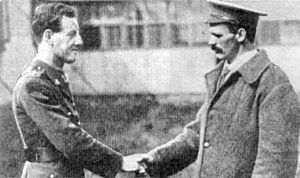
In June 1916, Jacka's division was sent to France to fight on the Western Front. They were near Armentières and took part in raids against German trenches. After many soldiers were lost in the Battle of the Somme, the 14th Battalion moved to the Pozières area.
On 7 August 1916, after heavy shelling, German soldiers took over part of the line where Jacka was. Jacka had just returned to his dug-out (a shelter in the ground). Two Germans threw a bomb into his dug-out, killing two of his men. Jacka came out and saw many Germans capturing about forty Australian soldiers.
Only seven of his men had recovered from the blast. Jacka gathered them and charged at the enemy. There was fierce hand-to-hand fighting. The Australian prisoners turned on their captors. Every man in Jacka's small group was wounded, including Jacka himself. He was hit seven times, including a bullet through his body and two head wounds. Fifty Germans were captured, and the line was taken back. Jacka was personally credited with killing between twelve and twenty Germans.
Jacka received the Military Cross (MC) for his actions at Pozières. Many people believed he deserved a second Victoria Cross for this brave act. However, his Australian commanders chose not to recommend him for it. Some historians think this might be because the Germans were able to get into Jacka's position easily in the first place. As an officer, he was responsible for preventing this.
After this incident, Jacka was sent to England to recover. He was promoted to lieutenant on 18 August 1916. On 29 September, he received his Victoria Cross from King George V at Windsor Castle. He rejoined his unit in November. On 15 March 1917, he was promoted to captain.
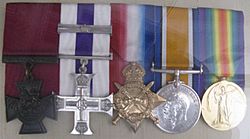
In early 1917, the Germans moved back to the Hindenburg Line. On 8 April, Jacka led a night patrol into "no man's land" near Bullecourt. He was checking German defenses before an Allied attack. He went through the enemy wire twice and reported back. Then he went out again to help guide the attack groups. During this, he captured two German soldiers by himself. He was awarded a Bar to his Military Cross for this action. This meant he received the MC a second time.
Jacka later led D Company, 14th Battalion. In June, he led his men through the Battle for Messines Ridge. His company captured several machine-gun posts and a German field gun. His actions here were not officially recognized. On 8 July, a sniper wounded him near Ploegsteert Wood. He spent nearly two months in the hospital.
Returning to the front, he led the 14th Battalion on 26 September. They attacked German pill-boxes during the Battle of Polygon Wood. Jacka was recommended for another award, but it was not given. In May 1918, Jacka was badly gassed near Villers-Bretonneux. A missile also went through his trachea. He was sent to a hospital and was not expected to live. When he recovered, he had two operations in Britain.
He returned to Australia on 6 September 1919. His time in the army ended on 10 January 1920. He came back to Melbourne as a hero.
Life After the War
After the war, Jacka had a job waiting for him with the Forests Department. But he decided to start his own business. With two former soldiers from his battalion, he created Roxburgh, Jacka & Co. Pty Ltd. This company imported and exported electrical goods. The business faced problems during the Great Depression and closed in 1931.
On 17 January 1921, Jacka married Frances Veronica Carey. She was a typist from his office. They lived in St. Kilda and later adopted a daughter named Betty. In September 1929, he was elected to the Council of the City of St Kilda. He became mayor the next year. He worked hard to help unemployed people and those facing eviction. He also suggested public works to create jobs.
On 14 December 1931, Jacka collapsed after a council meeting. He was taken to Caulfield Military Hospital. On 17 January 1932, one week after his 39th birthday, he died. He suffered from a kidney disease called chronic nephritis. He was buried at St Kilda Cemetery. Eight other Victoria Cross recipients helped carry his coffin. About 6,000 people watched his funeral procession.
Albert Jacka's Victoria Cross is on display at the Australian War Memorial in Canberra. A special service is held each year in St. Kilda to honor him.
Memorials
- Albert Jacka Grave, St Kilda (37°51′40″S 145°00′08″E / 37.861094°S 145.002349°E). A memorial service is held here every January.
- Jacka Park, Wedderburn, Victoria (33°46′32″S 151°17′06″E / 33.775598°S 151.285118°E) is named after him. The gates say "1914-18 Dedicated to the memory of Cpt. Albert Jacka V.C. M.C. & Bar".
- A plaque in the St Kilda Army and Navy Club RSL Sub Branch (37°52′03″S 144°58′44″E / 37.867466°S 144.978858°E). It honors Captain Albert Jacka.
- His name is on the State Forests Department Roll of Honour at Beechworth museum, Victoria.
- His name is on the Victoria Cross Memorial in Alfred Square, St Kilda.
- The suburb of Jacka in Canberra is named in his honor.
- Jacka Boulevard, St Kilda (37°51′56″S 144°58′24″E / 37.865673°S 144.97344°E) was named after him.
 | William M. Jackson |
 | Juan E. Gilbert |
 | Neil deGrasse Tyson |


